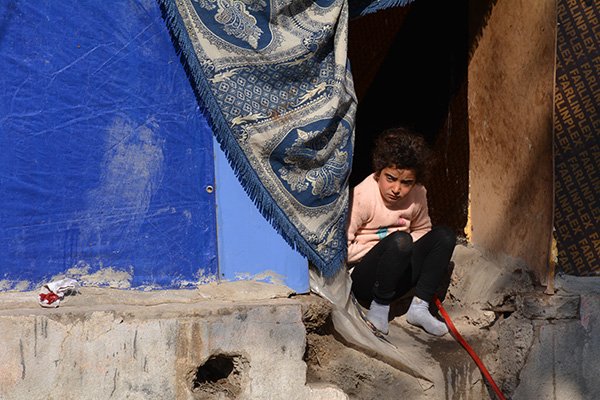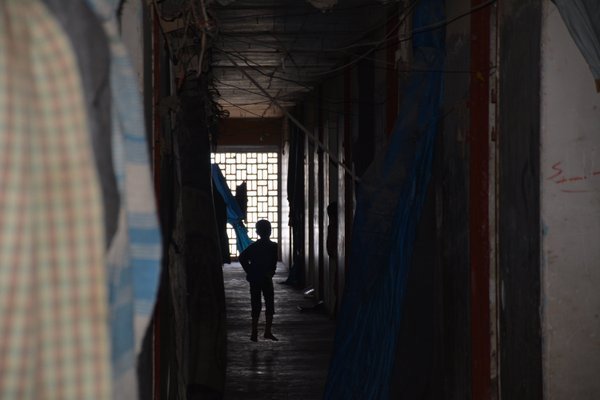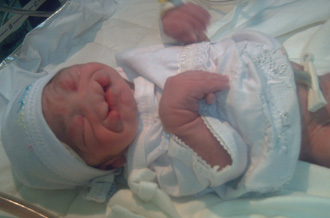She used them like an accent pillow to dress up her thin song.
And her lyrics are the only thing thin about her.
I'm sick of hearing what a 'feminist' Beyonce is.
There's nothing liberating about an overweight woman squeezing herself into a corset to create a tiny waist and the hips erupting below the corset.
That's not healthy at all.
(It's also not attractive.)
When Beyonce can get comfortable with her own size, I might see her as liberated.
Until then she's just teasing cock and coochie.
This is C.I.'s "Iraq snapshot:"
Thursday, February 11, 2016. Chaos and violence continue, War Hawk
Hillary Clinton continues to be pushed on her vote for the Iraq War, her
War Hawk buddies also becomes an issue, and much more.
Let's start with the ongoing Iraq War . Specifically, let's start with the decision to support it to begin with.
Yesterday, the US House Foreign Affairs Committee held a hearing on Iraq, Syria and Libya. Appearing before the Committee was President Barack Obama's Special Envoy Brett McGurk. The original decision to support the Iraq War was raised. First . . .
US House Rep Dana Rohrabacher: You know, frankly, we Republicans made a mistake when we backed our president when he said: "We have to get rid of Saddam Hussein." And frankly it looks like to me that all of this chaos and confusion that you're describing today that is unfortunately in your lap to try to correct started when we made a mistake [that] 'we have to get rid of Saddam Hussein because he's a bad guy and he's committing crimes against his own people and that's destabilizing the whole area.' [. . .]
Secondly . . .
US House Rep Gerry Connolly: I certainly want to concur with my friend from California and his critique of the mistake by Republicans in supporting the reckless foreign policy of George W. Bush. And I certainly want to associate myself with those remarks.
US House Rep Dan Rohrbacher: Absolutely.
Those darn Republicans, supporting, in 2002, the move to go to war on Iraq.
Darn Republicans.
What?
Oh, right.
Hillary Clinton voted for the Iraq War.
And she's not a Republican -- not anymore, right?
She was on stage tonight in Milawukee (wearing another ridiculous outfit -- is 'business professional' just beyond her understanding?). It was the Democratic Party debate, the latest one. This one hosted by PBS and THE PBS NEWSHOUR with news anchors Gwen Ifill and Judy Woodruff actings as moderators while Hillary debated Senator Bernie Sanders.
Wouldn't you know it? Iraq was an issue.
Specifically, Hillary's vote for the United States to go to war with Iraq.
This is from the transcript provided by THE WASHINGTON POST (which is annotated online).
SANDERS: Let me just say this. What a president of the United States has got to do -- and what is his or her major, I think, responsibility -- is to, A, make certain that we keep our people safe, that we work with allies around the world to protect...
... president of the United States has got to do, and what is his or her major, I think, responsibility, is to, A, make certain that we keep our people safe. Thatwe work with allies around the world to protect democratic values . That we do all that we can to create a world of peace and prosperity.
I voted against the war in Iraq because I listened very carefully to what President Bush and Vice President Cheney had to say and I didn't believe them. And if you go to my Web site, berniesanders.com, what you find is not only going to help lead the opposition to that war, but much of what I feared would happen when I spoke on the floor of the House, in fact, did happen in terms of the instability that occurred.
Now I think an area in kind of a vague way, or not so vague, where Secretary Clinton and I disagree is the area of regime change. Look, the truth is that a powerful nation like the United States, certainly working with our allies, we can overthrow dictators all over the world.
And God only knows Saddam Hussein was a brutal dictator. We could overthrow Assad tomorrow if we wanted to. We got rid of Gadhafi. But the point about foreign policy is not just to know that you can overthrow a terrible dictator, it's to understand what happens the day after.
And in Libya, for example, the United States, Secretary Clinton, as secretary of state, working with some other countries, did get rid of a terrible dictator named Gadhafi. But what happened is a political vacuum developed. ISIS came in, and now occupies significant territory in Libya, and is now prepared, unless we stop them, to have a terrorist foothold.
But this is nothing new. This has gone on 50 or 60 years where the United States has been involved in overthrowing governments. Mossadegh back in 1953. Nobody knows who Mossadegh was, democratically-elected prime minister of Iran. He was overthrown by British and American interests because he threatened oil interests of the British. And as a result of that, the shah of Iran came in, terrible dictator. The result of that, you had the Iranian Revolution coming in, and that is where we are today.Unintended consequences.
So I believe as president I will look very carefully about unintended consequences. I will do everything I can to make certain that the United States and our brave men and women in the military do not get bogged down in perpetual warfare in the Middle East.
(APPLAUSE)
CLINTON: If I could just respond. Two points. One,Senator
Sanders voted in 1998 on what I think is fair to call a regime change
resolution with respect to Iraq, calling for the end of Saddam Hussein's
regime.
He
voted in favor of regime change with Libya, voted in favor of the
Security Council being an active participate in setting the parameters
for what we would do, which of course we followed through on.
I do not believe a vote in 2002 is a plan to defeat ISIS in 2016. It's very important we focus on the threats we face today, and that we understand the complicated and dangerous world we are in.
When people go to vote in primaries or caucuses, they are voting not only for the president, they are voting for the commander-in- chief. And it's important that people really look hard at what the threats and dangers we face are, and who is best prepared for dealing with them.
As
we all remember, Senator Obama, when he ran against me, was against the
war in Iraq. And yet when he won, he turned to me, trusting my
judgment, my experience, to become secretary of state.
I was very honored to be asked to do that and very honored to serve with him those first four years.
(APPLAUSE)
SANDERS: Judy, if I can, there is no question, Secretary Clinton and I are friends, and I have a lot of respect for her, that she has enormous experience in foreign affairs. Secretary of state for four years. You've got a bit of experience, I would imagine.
But judgment matters as well. Judgment matters as well. And she and I looked at the same evidence coming from the Bush administration regarding Iraq. I lead the opposition against it. She voted for it.
But more importantly, in terms of this Libya resolution that you have noted before, this was a virtually unanimous consent. Everybody voted for it wanting to see Libya move toward democracy, of course we all wanted to do that.
SANDERS: That is very different than talking about specific action for regime change, which I did not support.
"I do not believe a vote in 2002 is a plan to defeat ISIS in 2016," Hillary grumped.
Nor is saying "I made a mistake" owning your destructive vote.
Hillary has refused to address the needs of the Iraqi people.
Yet again, she insisted she was a champion of women -- those who didn't claim to sleep with her husband, to be raped by her husband or to be harassed by her husband.
Well no woman from Iraq has ever claimed Bill Clinton made unwanted advances so what's Hillary's excuse for do nothing to help the women of Iraq?
She's the woman who calls herself a champion of women. She's the woman who now says her vote for the Iraq War was a mistake.
A mistake?
Wearing that ugly canary yellow top that looked like it was from the Chairman Mao collection to a professional debate was a mistake.
The birth defects in Iraq? That's not a mistake. That's a tragedy brought on by a crime.
What's Hillary going to do about that?
Nothing,
For nearly 8 years now, she's given lip service to "I made a mistake" but she's never once explained how she would correct that mistake, what she's doing to atone for it.
We're all supposed to be thrilled that Hillary can now call her vote to endorse a criminal war of aggression was a "mistake."
Hillary's a neocon.
It's why she made Victoria Nuland the spokesperson for the US State Dept and why she made Nuland's husband Robert Kagan an advisor.
Here's Leslie Kelb writing at DEMOCRACY JOURNAL:
Robert Kagan, the neoconservative extraordinaire, sees this shift as an opportunity to change the political center of gravity and is trying to shape the new consensus. In his latest book, The World America Made (2012), and other writings, he is reaching across the decades-old political abyss to tempted Democrats. And there, he has found Hillary Clinton, the unannounced Democratic nominee for President, among others, carefully reaching back. This potential embrace on international matters is not beyond the means of such experienced players. Foreign-policy alignments have shallower roots than domestic policy differences, and historically, the parties have enjoyed considerable overlapping of hawks and doves, activists, and de facto isolationists. Moreover, these positions can change on a dime.
Kagan’s courtship of Clinton has been quite open. “I feel comfortable with her on foreign policy,” he told The New York Times in June. “[I]t’s something that might have been called neocon, but clearly her supporters are not going to call it that.” He himself tellingly prefers the term “liberal interventionist.”
Kagan has his reasons for saying this publicly, not least the shifting sands of his own Republican Party. The Obama years have bared new conflicts among conservatives, particularly between the majority that still backs strong U.S. military responses to terrorist threats in the Mideast and a vocal minority of self-styled Tea Party libertarians who share left-wing Democrats’ disdain for foreign military entanglements. Accordingly, Kagan is hedging his bets by trying to fashion a new home, virtually constructing it himself—a de facto coalition of activist Republicans and Democrats. The Republicans in this ad hoc group are unlikely to campaign for Clinton, but they will be careful about attacking her foreign-policy views and will be well positioned to support her national-security positions if she wins.
[. . .]
For much of this period of neoconservative ascendance, Robert Kagan has been their intellectual tribune. This is why his courtship of Clinton is so interesting. Kagan’s open flirtation with Clinton has been coyly accepted and even reciprocated. While continuing to clutch the liberals’ new priorities like women’s rights, democracy, and climate change in her left hand, she is extending her right hand to the hawks. Few failed to notice when she selected Kagan to sit on her bipartisan State Department advisory group or when she picked his wife, Victoria Nuland, a very accomplished diplomat in her own right, as her spokeswoman. And it’s no accident that the much-admired former Deputy Secretary of State Strobe Talbott, a friend to the Clintons and Kagans, keeps Kagan on at the venerable Brookings Institution as a senior fellow.
She calls her vote a 'mistake' yet she continues to pal around with and seek the counsel of those who advocated for that 'mistake.'
Hillary's a liar.
And who she hangs with says a great deal about her lack of ethics.
Back to tonight's debate:
SANDERS: Judy, one area very briefly...
WOODRUFF: Just a final word.
SANDERS: Where the secretary and I have a very profound difference, in the last debate -- and I believe in her book -- very good book, by the way -- in her book and in this last debate,
she talked about getting the approval or the support or the mentoring
of Henry Kissinger. Now, I find it rather amazing, because I
happen to believe that Henry Kissinger was one of the most destructive
secretaries of state in the modern history of this country .
(APPLAUSE)
I am proud to say that Henry Kissinger is not my friend. I will not take advice from Henry Kissinger.
And in fact, Kissinger's actions in Cambodia, when the United States
bombed that country, overthrew Prince Sihanouk, created the instability
for Pol Pot and the Khmer Rouge to come in, who then butchered some 3
million innocent people, one of the worst genocides in the history of
the world. So count me in as somebody who will not be listening to Henry
Kissinger.
(APPLAUSE)
IFILL: Secretary Clinton?
CLINTON: Well, I know journalists have asked who you do listen to on foreign policy, and we have yet to know who that is.
SANDERS: Well, it ain'tHenry Kissinger . That's for sure.
CLINTON: That's fine. That's fine.
(LAUGHTER)
You know, I listen to a wide variety of voices that have expertise in various areas. I think it is fair to say,whatever the complaints that you want to make about him are , that with respect to China, one of the most challenging relationships we have ,
his opening up China and his ongoing relationships with the leaders of
China is an incredibly useful relationship for the United States of
America.
(APPLAUSE)
So if we want to pick and choose -- and I certainly do -- people I listen to, people I don't listen to, people I listen to for certain areas, then I think we have to be fair and look at the entire world, because it's a big, complicated world out there.
SANDERS: It is.
CLINTON: And, yes, people we may disagree with on a number of things may have some insight, may have some relationships that are important for the president to understand in order to best protect the United States.
(APPLAUSE)
SANDERS: I find -- I mean, it's just a very different, you know, historical perspective here.Kissinger
was one of those people during the Vietnam era who talked about the
domino theory. Not everybody remembers that. You do. I do. The domino
theory, you know, if Vietnam goes, China, da, da, da, da, da, da, da.
That's what he talked about, the great threat of China.
And then, after the war, this is the guy who, in fact, yes, you're right, he opened up relations with China, and now pushed various type of trade agreements, resulting in American workers losing their jobs as corporations moved to China. The terrible, authoritarian, Communist dictatorship he warned us about, now he's urging companies to shut down and move to China. Not my kind of guy.
Henry Kissinger made have played footsie with the likes of Gloria Steinem (another Hillary supporter) but he's better known for being a caged American citizen.
By which I mean that Henry is not free range.
He can't travel to this country or that country for fear that they might extradite him and he might go on trial at the Hague for War Crimes.
His War Crimes are too numerous to offer even a sweeping overview.
Instead, we'll just focus on Chile.
In 1998, he faced criticism for his War Crimes. Bill and Hillary stood by him.
Here's Martin McLaughlin (WSWS):
If Augusto Pinochet deserves detention, trial and punishment for mass murder, then what about his American controllers--Henry Kissinger, then-CIA director Richard Helms and other US government officials who inspired, directed and supported the 1973 military coup in Chile?
The official American reaction to the detention of Pinochet has been sympathetic to the former dictator. The Clinton administration is opposing his extradition out of concern that a public trial in Spain would bring to light the extensive involvement of US intelligence agencies in Pinochet's bloody deeds.
Pinochet's seizure of power on September 11, 1973 was the product of a protracted US campaign of political manipulation and destabilization in Chile. In 1964 the Johnson administration poured tens of millions of dollars into a covert campaign to insure the election of Christian Democrat Eduardo Frei as president, over the Socialist Party candidate Salvador Allende.
In 1970, with Frei ineligible to succeed himself and Allende the favorite to win the next election, Chile became a problem for the Nixon administration. The super-secret 40 Committee, a high-level body chaired by Henry Kissinger, with representatives from the State Department, CIA and Pentagon, decided that a massive electoral intervention would likely spark a backlash. US Ambassador Edward Korry urgently recommended a CIA covert operation to prepare a preemptive military coup.
Kissinger declared, "I don't see why we need to stand by and watch a country go Communist because of the irresponsibility of its own people." But he and CIA Director Helms blocked the proposed pre-election coup as unworkable. More time was needed, they argued.
Allende won the election on a reformist program, but his victory sparked a mass movement of the working class and poor peasants which had immense revolutionary potential. Allende and his Stalinist backers in the Chilean Communist Party spent the next three years restraining, discouraging and disorienting the mass movement, blocking any decisive challenge to the Chilean ruling class and American imperialism, while the right-wing and fascist elements prepared their counterattack. During this period there were six unsuccessful right-wing coup attempts, most of them with direct American aid.
The US involvement in coup planning began even before Allende's election victory, under the codename FUBELT, with action plans prepared for Kissinger's consideration. One group of officers working under CIA direction carried out the assassination of General Rene Schneider, a pro-Allende officer, in an unsuccessful attempt to spark a full-scale coup before Allende could take office.
A CIA cable from October 16, 1970, released under the Freedom of Information Act, spells out US government objectives: "It is firm and continuing policy that Allende be overthrown by a coup.... We are to continue to generate maximum pressure toward this end utilizing every appropriate resource. It is imperative that these actions be implemented clandestinely and securely so that the USG and -American hand be well hidden."
In 2002, Jonathan Franklin and Duncan Campbell (GUARDIAN) noted:
Henry Kissinger may face extradition proceedings in connection with the role of the United States in the 1973 military coup in Chile.
The former US secretary of state is wanted for questioning as a witness in the investigation into the events surrounding the overthrow of the socialist president, Salvador Allende, by General Augusto Pinochet.
It focuses on CIA involvement in the coup, whether US officials passed lists of leftwing Americans in Chile to the military and whether the US embassy failed to assist Americans deemed sympathetic to the deposed government.
Chile's Judge Juan Guzman is so frustrated by the lack of cooperation by Mr Kissinger that he is now considering an extradition request to force him to come to Chile and testify in connection with the death of the American film-maker and journalist Charles Horman, who was killed by the military days after the coup.
Horman's story was told in the 1982 Costa-Gavras film, Missing, starring Jack Lemmon and Sissy Spacek.
Judge Guzman is investigating whether US officials passed the names of suspected leftwing Americans to Chilean military authorities. Declassified documents have now revealed that such a list existed. Sergio Corvalan, a Chilean lawyer, said that he could not divulge the "dozens" of names on the list.
At the time of his death, Horman was investigating the murder of Rene Schneider, the chief of staff in the Chilean army whose support for Allende and the constitution was seen as an obstacle to the coup.
Time and again, Hillary sides with the wrong people -- Kagan, Kissinger, Mad Maddie Albright.
It's a pattern with her.
She repeatedly befriends people whose actions demonstrate contempt for human life and for participatory democracy.
Her addiction to regime change is rooted in the belief system she shared with Albright, Kagan and Kissinger.
.
In tonight's debate, she insisted, "I do not believe a vote in 2002 is a plan to defeat ISIS in 2016. It's very important we focus on the threats we face today, and that we understand the complicated and dangerous world we are in. When people go to vote in primaries or caucuses, they are voting not only for the president, they are voting for the commander-in- chief. And it's important that people really look hard at what the threats and dangers we face are, and who is best prepared for dealing with them."
Now she's claiming she's fit to be commander-in-chief?
She who would send US troops into any war at a moment's notice, without reading intel or carefully vetting a decision of what is the best option?
And should she become president and send thousands more US troops to their deaths, will she blame that "mistake" on Bully Boy Bush as well?
The Iraq War she endorsed and sought continues to this day.
Today, the US Defense Dept announced/claimed/asserted/bragged:
Strikes in Iraq
Attack, fighter and remotely piloted aircraft and rocket artillery conducted 13 strikes in Iraq, coordinated with and in support of Iraq’s government:
-- Near Albu Hayat, two strikes struck two separate ISIL tactical units and destroyed an ISIL vehicle.
-- Near Habbaniyah, a strike struck an ISIL tactical unit and destroyed an ISIL fighting position.
-- Near Kirkuk, a strike destroyed eight ISIL fighting positions.
-- Near Kisik, a strike struck an ISIL tactical unit and destroyed an ISIL tunnel.
-- Near Mosul, three strikes struck an ISIL tactical unit and destroyed an ISIL checkpoint, seven ISIL fighting positions, an ISIL vehicle and an ISIL assembly area.
-- Near Ramadi, three strikes struck an ISIL tactical unit and destroyed an ISIL bunker and denied ISIL access to terrain.
-- Near Sinjar, a strike struck an ISIL tactical unit and destroyed an ISIL fighting position.
-- Near Albu Hayat, one strike struck inoperable coalition equipment, denying ISIL access in support of coalition operations.
Task force officials define a strike as one or more kinetic events that occur in roughly the same geographic location to produce a single, sometimes cumulative, effect. Therefore, officials explained, a single aircraft delivering a single weapon against a lone ISIL vehicle is one strike, but so is multiple aircraft delivering dozens of weapons against buildings, vehicles and weapon systems in a compound, for example, having the cumulative effect of making those targets harder or impossible for ISIL to use. Accordingly, officials said, they do not report the number or type of aircraft employed in a strike, the number of munitions dropped in each strike, or the number of individual munition impact points against a target.
iraq
pbs
the newshour
judy woodruff
gwen ifill
duncan campbell
Let's start with the ongoing Iraq War . Specifically, let's start with the decision to support it to begin with.
Yesterday, the US House Foreign Affairs Committee held a hearing on Iraq, Syria and Libya. Appearing before the Committee was President Barack Obama's Special Envoy Brett McGurk. The original decision to support the Iraq War was raised. First . . .
US House Rep Dana Rohrabacher: You know, frankly, we Republicans made a mistake when we backed our president when he said: "We have to get rid of Saddam Hussein." And frankly it looks like to me that all of this chaos and confusion that you're describing today that is unfortunately in your lap to try to correct started when we made a mistake [that] 'we have to get rid of Saddam Hussein because he's a bad guy and he's committing crimes against his own people and that's destabilizing the whole area.' [. . .]
Secondly . . .
US House Rep Gerry Connolly: I certainly want to concur with my friend from California and his critique of the mistake by Republicans in supporting the reckless foreign policy of George W. Bush. And I certainly want to associate myself with those remarks.
US House Rep Dan Rohrbacher: Absolutely.
Those darn Republicans, supporting, in 2002, the move to go to war on Iraq.
Darn Republicans.
.@BernieSanders wise vote against #Iraq War is one reason why @PeaceAction endorsed him over @HillaryClinton #democraticdebate
What?
Oh, right.
Hillary Clinton voted for the Iraq War.
And she's not a Republican -- not anymore, right?
She was on stage tonight in Milawukee (wearing another ridiculous outfit -- is 'business professional' just beyond her understanding?). It was the Democratic Party debate, the latest one. This one hosted by PBS and THE PBS NEWSHOUR with news anchors Gwen Ifill and Judy Woodruff actings as moderators while Hillary debated Senator Bernie Sanders.
Wouldn't you know it? Iraq was an issue.
Specifically, Hillary's vote for the United States to go to war with Iraq.
This is from the transcript provided by THE WASHINGTON POST (which is annotated online).
SANDERS: Let me just say this. What a president of the United States has got to do -- and what is his or her major, I think, responsibility -- is to, A, make certain that we keep our people safe, that we work with allies around the world to protect...
... president of the United States has got to do, and what is his or her major, I think, responsibility, is to, A, make certain that we keep our people safe. That
I voted against the war in Iraq because I listened very carefully to what President Bush and Vice President Cheney had to say and I didn't believe them. And if you go to my Web site, berniesanders.com, what you find is not only going to help lead the opposition to that war, but much of what I feared would happen when I spoke on the floor of the House, in fact, did happen in terms of the instability that occurred.
Now I think an area in kind of a vague way, or not so vague, where Secretary Clinton and I disagree is the area of regime change. Look, the truth is that a powerful nation like the United States, certainly working with our allies, we can overthrow dictators all over the world.
And God only knows Saddam Hussein was a brutal dictator. We could overthrow Assad tomorrow if we wanted to. We got rid of Gadhafi. But the point about foreign policy is not just to know that you can overthrow a terrible dictator, it's to understand what happens the day after.
And in Libya, for example, the United States, Secretary Clinton, as secretary of state, working with some other countries, did get rid of a terrible dictator named Gadhafi. But what happened is a political vacuum developed. ISIS came in, and now occupies significant territory in Libya, and is now prepared, unless we stop them, to have a terrorist foothold.
But this is nothing new. This has gone on 50 or 60 years where the United States has been involved in overthrowing governments. Mossadegh back in 1953. Nobody knows who Mossadegh was, democratically-elected prime minister of Iran. He was overthrown by British and American interests because he threatened oil interests of the British. And as a result of that, the shah of Iran came in, terrible dictator. The result of that, you had the Iranian Revolution coming in, and that is where we are today.
So I believe as president I will look very carefully about unintended consequences. I will do everything I can to make certain that the United States and our brave men and women in the military do not get bogged down in perpetual warfare in the Middle East.
(APPLAUSE)
CLINTON: If I could just respond. Two points. One,
I do not believe a vote in 2002 is a plan to defeat ISIS in 2016. It's very important we focus on the threats we face today, and that we understand the complicated and dangerous world we are in.
When people go to vote in primaries or caucuses, they are voting not only for the president, they are voting for the commander-in- chief. And it's important that people really look hard at what the threats and dangers we face are, and who is best prepared for dealing with them.
I was very honored to be asked to do that and very honored to serve with him those first four years.
(APPLAUSE)
SANDERS: Judy, if I can, there is no question, Secretary Clinton and I are friends, and I have a lot of respect for her, that she has enormous experience in foreign affairs. Secretary of state for four years. You've got a bit of experience, I would imagine.
But judgment matters as well. Judgment matters as well. And she and I looked at the same evidence coming from the Bush administration regarding Iraq. I lead the opposition against it. She voted for it.
But more importantly, in terms of this Libya resolution that you have noted before, this was a virtually unanimous consent. Everybody voted for it wanting to see Libya move toward democracy, of course we all wanted to do that.
SANDERS: That is very different than talking about specific action for regime change, which I did not support.
"I do not believe a vote in 2002 is a plan to defeat ISIS in 2016," Hillary grumped.
Nor is saying "I made a mistake" owning your destructive vote.
Hillary has refused to address the needs of the Iraqi people.
Yet again, she insisted she was a champion of women -- those who didn't claim to sleep with her husband, to be raped by her husband or to be harassed by her husband.
Well no woman from Iraq has ever claimed Bill Clinton made unwanted advances so what's Hillary's excuse for do nothing to help the women of Iraq?
She's the woman who calls herself a champion of women. She's the woman who now says her vote for the Iraq War was a mistake.
A mistake?
Wearing that ugly canary yellow top that looked like it was from the Chairman Mao collection to a professional debate was a mistake.
The birth defects in Iraq? That's not a mistake. That's a tragedy brought on by a crime.
What's Hillary going to do about that?
Nothing,
For nearly 8 years now, she's given lip service to "I made a mistake" but she's never once explained how she would correct that mistake, what she's doing to atone for it.
We're all supposed to be thrilled that Hillary can now call her vote to endorse a criminal war of aggression was a "mistake."
Hillary's a neocon.
It's why she made Victoria Nuland the spokesperson for the US State Dept and why she made Nuland's husband Robert Kagan an advisor.
Here's Leslie Kelb writing at DEMOCRACY JOURNAL:
Robert Kagan, the neoconservative extraordinaire, sees this shift as an opportunity to change the political center of gravity and is trying to shape the new consensus. In his latest book, The World America Made (2012), and other writings, he is reaching across the decades-old political abyss to tempted Democrats. And there, he has found Hillary Clinton, the unannounced Democratic nominee for President, among others, carefully reaching back. This potential embrace on international matters is not beyond the means of such experienced players. Foreign-policy alignments have shallower roots than domestic policy differences, and historically, the parties have enjoyed considerable overlapping of hawks and doves, activists, and de facto isolationists. Moreover, these positions can change on a dime.
Kagan’s courtship of Clinton has been quite open. “I feel comfortable with her on foreign policy,” he told The New York Times in June. “[I]t’s something that might have been called neocon, but clearly her supporters are not going to call it that.” He himself tellingly prefers the term “liberal interventionist.”
Kagan has his reasons for saying this publicly, not least the shifting sands of his own Republican Party. The Obama years have bared new conflicts among conservatives, particularly between the majority that still backs strong U.S. military responses to terrorist threats in the Mideast and a vocal minority of self-styled Tea Party libertarians who share left-wing Democrats’ disdain for foreign military entanglements. Accordingly, Kagan is hedging his bets by trying to fashion a new home, virtually constructing it himself—a de facto coalition of activist Republicans and Democrats. The Republicans in this ad hoc group are unlikely to campaign for Clinton, but they will be careful about attacking her foreign-policy views and will be well positioned to support her national-security positions if she wins.
[. . .]
For much of this period of neoconservative ascendance, Robert Kagan has been their intellectual tribune. This is why his courtship of Clinton is so interesting. Kagan’s open flirtation with Clinton has been coyly accepted and even reciprocated. While continuing to clutch the liberals’ new priorities like women’s rights, democracy, and climate change in her left hand, she is extending her right hand to the hawks. Few failed to notice when she selected Kagan to sit on her bipartisan State Department advisory group or when she picked his wife, Victoria Nuland, a very accomplished diplomat in her own right, as her spokeswoman. And it’s no accident that the much-admired former Deputy Secretary of State Strobe Talbott, a friend to the Clintons and Kagans, keeps Kagan on at the venerable Brookings Institution as a senior fellow.
She calls her vote a 'mistake' yet she continues to pal around with and seek the counsel of those who advocated for that 'mistake.'
Hillary's a liar.
And who she hangs with says a great deal about her lack of ethics.
Back to tonight's debate:
SANDERS: Judy, one area very briefly...
WOODRUFF: Just a final word.
SANDERS: Where the secretary and I have a very profound difference, in the last debate -- and I believe in her book -- very good book, by the way -- in her book and in this last debate,
(APPLAUSE)
IFILL: Secretary Clinton?
CLINTON: Well, I know journalists have asked who you do listen to on foreign policy, and we have yet to know who that is.
SANDERS: Well, it ain't
CLINTON: That's fine. That's fine.
(LAUGHTER)
You know, I listen to a wide variety of voices that have expertise in various areas. I think it is fair to say,
(APPLAUSE)
So if we want to pick and choose -- and I certainly do -- people I listen to, people I don't listen to, people I listen to for certain areas, then I think we have to be fair and look at the entire world, because it's a big, complicated world out there.
SANDERS: It is.
CLINTON: And, yes, people we may disagree with on a number of things may have some insight, may have some relationships that are important for the president to understand in order to best protect the United States.
(APPLAUSE)
SANDERS: I find -- I mean, it's just a very different, you know, historical perspective here.
And then, after the war, this is the guy who, in fact, yes, you're right, he opened up relations with China, and now pushed various type of trade agreements, resulting in American workers losing their jobs as corporations moved to China. The terrible, authoritarian, Communist dictatorship he warned us about, now he's urging companies to shut down and move to China. Not my kind of guy.
Henry Kissinger made have played footsie with the likes of Gloria Steinem (another Hillary supporter) but he's better known for being a caged American citizen.
By which I mean that Henry is not free range.
He can't travel to this country or that country for fear that they might extradite him and he might go on trial at the Hague for War Crimes.
His War Crimes are too numerous to offer even a sweeping overview.
Instead, we'll just focus on Chile.
In 1998, he faced criticism for his War Crimes. Bill and Hillary stood by him.
Here's Martin McLaughlin (WSWS):
If Augusto Pinochet deserves detention, trial and punishment for mass murder, then what about his American controllers--Henry Kissinger, then-CIA director Richard Helms and other US government officials who inspired, directed and supported the 1973 military coup in Chile?
The official American reaction to the detention of Pinochet has been sympathetic to the former dictator. The Clinton administration is opposing his extradition out of concern that a public trial in Spain would bring to light the extensive involvement of US intelligence agencies in Pinochet's bloody deeds.
Pinochet's seizure of power on September 11, 1973 was the product of a protracted US campaign of political manipulation and destabilization in Chile. In 1964 the Johnson administration poured tens of millions of dollars into a covert campaign to insure the election of Christian Democrat Eduardo Frei as president, over the Socialist Party candidate Salvador Allende.
In 1970, with Frei ineligible to succeed himself and Allende the favorite to win the next election, Chile became a problem for the Nixon administration. The super-secret 40 Committee, a high-level body chaired by Henry Kissinger, with representatives from the State Department, CIA and Pentagon, decided that a massive electoral intervention would likely spark a backlash. US Ambassador Edward Korry urgently recommended a CIA covert operation to prepare a preemptive military coup.
Kissinger declared, "I don't see why we need to stand by and watch a country go Communist because of the irresponsibility of its own people." But he and CIA Director Helms blocked the proposed pre-election coup as unworkable. More time was needed, they argued.
Allende won the election on a reformist program, but his victory sparked a mass movement of the working class and poor peasants which had immense revolutionary potential. Allende and his Stalinist backers in the Chilean Communist Party spent the next three years restraining, discouraging and disorienting the mass movement, blocking any decisive challenge to the Chilean ruling class and American imperialism, while the right-wing and fascist elements prepared their counterattack. During this period there were six unsuccessful right-wing coup attempts, most of them with direct American aid.
The US involvement in coup planning began even before Allende's election victory, under the codename FUBELT, with action plans prepared for Kissinger's consideration. One group of officers working under CIA direction carried out the assassination of General Rene Schneider, a pro-Allende officer, in an unsuccessful attempt to spark a full-scale coup before Allende could take office.
A CIA cable from October 16, 1970, released under the Freedom of Information Act, spells out US government objectives: "It is firm and continuing policy that Allende be overthrown by a coup.... We are to continue to generate maximum pressure toward this end utilizing every appropriate resource. It is imperative that these actions be implemented clandestinely and securely so that the USG and -American hand be well hidden."
In 2002, Jonathan Franklin and Duncan Campbell (GUARDIAN) noted:
Henry Kissinger may face extradition proceedings in connection with the role of the United States in the 1973 military coup in Chile.
The former US secretary of state is wanted for questioning as a witness in the investigation into the events surrounding the overthrow of the socialist president, Salvador Allende, by General Augusto Pinochet.
It focuses on CIA involvement in the coup, whether US officials passed lists of leftwing Americans in Chile to the military and whether the US embassy failed to assist Americans deemed sympathetic to the deposed government.
Chile's Judge Juan Guzman is so frustrated by the lack of cooperation by Mr Kissinger that he is now considering an extradition request to force him to come to Chile and testify in connection with the death of the American film-maker and journalist Charles Horman, who was killed by the military days after the coup.
Horman's story was told in the 1982 Costa-Gavras film, Missing, starring Jack Lemmon and Sissy Spacek.
Judge Guzman is investigating whether US officials passed the names of suspected leftwing Americans to Chilean military authorities. Declassified documents have now revealed that such a list existed. Sergio Corvalan, a Chilean lawyer, said that he could not divulge the "dozens" of names on the list.
At the time of his death, Horman was investigating the murder of Rene Schneider, the chief of staff in the Chilean army whose support for Allende and the constitution was seen as an obstacle to the coup.
Time and again, Hillary sides with the wrong people -- Kagan, Kissinger, Mad Maddie Albright.
It's a pattern with her.
She repeatedly befriends people whose actions demonstrate contempt for human life and for participatory democracy.
Her addiction to regime change is rooted in the belief system she shared with Albright, Kagan and Kissinger.
.
In tonight's debate, she insisted, "I do not believe a vote in 2002 is a plan to defeat ISIS in 2016. It's very important we focus on the threats we face today, and that we understand the complicated and dangerous world we are in. When people go to vote in primaries or caucuses, they are voting not only for the president, they are voting for the commander-in- chief. And it's important that people really look hard at what the threats and dangers we face are, and who is best prepared for dealing with them."
Now she's claiming she's fit to be commander-in-chief?
She who would send US troops into any war at a moment's notice, without reading intel or carefully vetting a decision of what is the best option?
And should she become president and send thousands more US troops to their deaths, will she blame that "mistake" on Bully Boy Bush as well?
The Iraq War she endorsed and sought continues to this day.
Today, the US Defense Dept announced/claimed/asserted/bragged:
Strikes in Iraq
Attack, fighter and remotely piloted aircraft and rocket artillery conducted 13 strikes in Iraq, coordinated with and in support of Iraq’s government:
-- Near Albu Hayat, two strikes struck two separate ISIL tactical units and destroyed an ISIL vehicle.
-- Near Habbaniyah, a strike struck an ISIL tactical unit and destroyed an ISIL fighting position.
-- Near Kirkuk, a strike destroyed eight ISIL fighting positions.
-- Near Kisik, a strike struck an ISIL tactical unit and destroyed an ISIL tunnel.
-- Near Mosul, three strikes struck an ISIL tactical unit and destroyed an ISIL checkpoint, seven ISIL fighting positions, an ISIL vehicle and an ISIL assembly area.
-- Near Ramadi, three strikes struck an ISIL tactical unit and destroyed an ISIL bunker and denied ISIL access to terrain.
-- Near Sinjar, a strike struck an ISIL tactical unit and destroyed an ISIL fighting position.
-- Near Albu Hayat, one strike struck inoperable coalition equipment, denying ISIL access in support of coalition operations.
Task force officials define a strike as one or more kinetic events that occur in roughly the same geographic location to produce a single, sometimes cumulative, effect. Therefore, officials explained, a single aircraft delivering a single weapon against a lone ISIL vehicle is one strike, but so is multiple aircraft delivering dozens of weapons against buildings, vehicles and weapon systems in a compound, for example, having the cumulative effect of making those targets harder or impossible for ISIL to use. Accordingly, officials said, they do not report the number or type of aircraft employed in a strike, the number of munitions dropped in each strike, or the number of individual munition impact points against a target.
iraq
pbs
the newshour
judy woodruff
gwen ifill
duncan campbell

 ICRC
ICRC





 Rami
Rami



 The Bern Report
The Bern Report

 Cassandra Fairbanks
Cassandra Fairbanks
